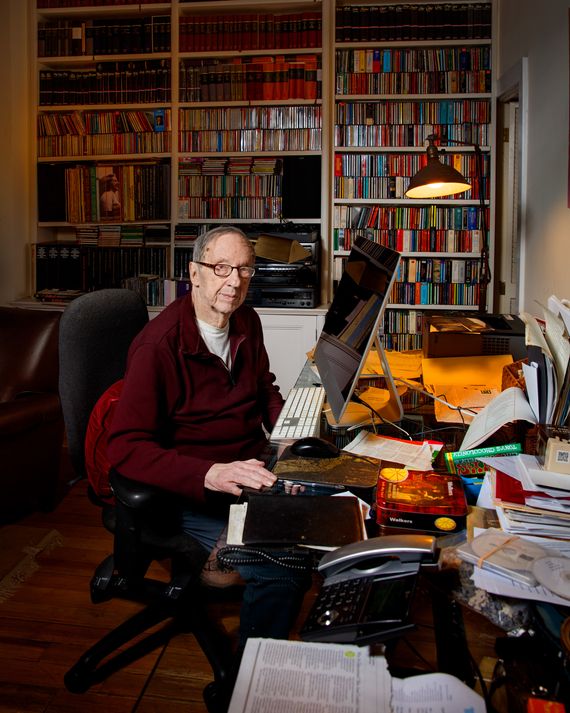
This article was featured in One Great Story, New YorkÔÇÖs reading recommendation newsletter. Sign up here to get it nightly.
The life of the editor Bob Gottlieb, at a spry 91 years old, is nowadays largely limited to a single room on the second floor of his East 48th Street townhouse ÔÇö by choice, not necessity. He can bound up Second Avenue just fine to the diner that he considers an extension of his home, where the waitress knows he takes his chocolate milkshakes extra thick. But everything he needs, his library and his pencils, is right here, so why go farther? To receive guests like this one, he didnÔÇÖt even have to put on shoes or tame the gullÔÇÖs-wing sweep of his silver hair. Burbling away in a leather club chair in his book-lined office (they are arranged according to a system, he says with a point to his head, thatÔÇÖs ÔÇ£up hereÔÇØ), with piles of more books on the floor and in the corners, beneath giant MGM publicity posters of Marion Davies, Clark Gable, and Norma Shearer from the early 1930s, he is a man in his element. ÔÇ£I donÔÇÖt want to go anywhere because thereÔÇÖs nowhere I want to go,ÔÇØ he says in his fluty register. ÔÇ£My life is very calm, just the way I like.ÔÇØ
It is here that he waits for one of his most famous writers ÔÇö and he has edited many of the past centuryÔÇÖs most famous ones, including Cheever, Rushdie, Lessing, and Naipaul ÔÇö to turn in a long-awaited manuscript. Assuming, that is, the pair beat what Gottlieb notes dryly are the ÔÇ£actuarial odds.ÔÇØ Robert Caro, 87, whom Gottlieb has edited since his first book, The Power Broker, published in 1974, is at work on the fifth and final volume of his Lyndon B. Johnson biography. Their long relationship is the subject of a documentary, Turn Every Page, directed by GottliebÔÇÖs daughter, Lizzie, which arrives (well before the Johnson book) on December 30.
Gottlieb is perhaps the longest-serving man in publishing, a living link to those days when a successful book editor and his stage-actress wife could buy themselves an entire Manhattan townhouse like this one and stuff it full of books. Their house, and his office, looks out onto the private, semi-communal Turtle Bay Gardens, shared with their neighbors on the block. ÔÇ£Bob never goes into the garden, you have to understand,ÔÇØ says GottliebÔÇÖs wife, Maria Tucci, who has come home with lunch. ÔÇ£He says real Jews donÔÇÖt like nature.ÔÇØ
Among their fellow Turtle Bay Gardeners over the years were Janet Malcolm and Gardner Botsford, the late New Yorker writer-editor couple, whose teenage daughter, Anne, became their babysitter. Katharine Hepburn lived along there, too (next door to Stephen Sondheim), and when Gottlieb was editing her book, heÔÇÖd nip across to her house for meetings, entering through her back door.
Gottlieb joined Simon & Schuster in 1955 and eventually became editor-in-chief, then ran Alfred A. Knopf. In 1987, S.ÔÇëI. Newhouse hired him to take over The New Yorker from William Shawn and then fired him a few years later in favor of Tina Brown (Newhouse mustÔÇÖve felt guilty because he promised him his New Yorker salary for life). Then it was back to Knopf. Even at 91, he continues to work on occasional projects as an editor-at-large. (His next, Flora Macdonald: ÔÇ£Pretty Young Rebel,ÔÇØ out in January, is by Flora Fraser, whose mother and grandmother he has also edited.) What Gottlieb does, what he has always done, is read ÔÇö widely and voraciously, if not, he says, as quickly as he once did. At the moment, he is making his way through a recent biography of George III, the essays of V.ÔÇëS. Pritchett, and the work of the Soviet novelist and journalist Vasily Grossman, though I also spot copies of Janet Evanovich and Colleen Hoover, the currently best-selling romance writer. An editor, he notes modestly, is really just a reader ÔÇö although he also likened the editing process to psychoanalysis, including the occasional transference.
Editors, as any editor can tell you, live in the shadow of their writers, reacting quietly behind the scenes, unheralded and little known. This is, evidently, how Gottlieb prefers it. ÔÇ£This glorification of editors, of which I have been an extreme example, is not a wholesome thing,ÔÇØ he once told The Paris Review. ÔÇ£The editorÔÇÖs relationship to a book should be an invisible one,ÔÇØ he said then and believes today. ÔÇ£The last thing anyone reading Jane Eyre would want to know, for example, is that I had convinced Charlotte Bront├½ that the first Mrs. Rochester should go up in flames.ÔÇØ He insists editing is neither an art nor a craft. ItÔÇÖs just ÔÇ£what I do,ÔÇØ he says. ÔÇ£IÔÇÖm not an abstract thinker. I donÔÇÖt think, really ÔÇö I just react, which is what editors are supposed to do.ÔÇØ When I tried to press him further, he waved me away. ÔÇ£DonÔÇÖt you feel like an idiot having to ask questions like that?ÔÇØ
Turn Every Page attempts to answer some of them. The film is a tender portrait of the two men that is saved from schmaltz by their occasional testiness, CaroÔÇÖs in particular. According to Gottlieb, it has always been thus. ÔÇ£He was very wary about revealing himself,ÔÇØ he says of Caro. ÔÇ£I used to joke when we first met each other ÔÇö I felt that if I said to him, ÔÇÿHow are you?ÔÇÖ that was too invasive a question.ÔÇØ Fifty years later, and thanks in part to the film, he adds, ÔÇ£heÔÇÖs finally acknowledged that we are friends.ÔÇØ Until making it, Lizzie Gottlieb had barely met Caro, and it took some persistence to wear down his resolve. Her father was easier to crack. ÔÇ£Anything she wants is hers by definition,ÔÇØ he says.
Caro was a broke former Newsday reporter when he started work on The Power Broker, his megalithic study of Robert Moses. He delivered to Gottlieb a manuscript that, at over a million words, would be impossible to fit in a single volume and suggested publishing it in two. ÔÇ£We may be able to get people interested in Robert Moses once,ÔÇØ Gottlieb tells me ÔÇö heÔÇÖs said this before ÔÇö ÔÇ£but we certainly canÔÇÖt do it twice.ÔÇØ They set about trimming it by a third, but the finished book is still 1,200 pages. It won the Pulitzer Prize and is in its 66th printing.
Caro was not going to be limited by single volumes after that. From the start, the Johnson biography was planned to be three, though since then itÔÇÖs grown to four published and one more on the way. ÔÇ£I donÔÇÖt see anything while heÔÇÖs writing,ÔÇØ Gottlieb says. If he has any idea when the book will issue from CaroÔÇÖs Smith Corona, he isnÔÇÖt saying. (Gottlieb himself uses a Mac.)
Turn Every Page plays up the drama of the editing process, emphasizing the (offscreen) sparring between the two men on subjects great and small. (There were, apparently, many blowups about punctuation, most especially the semi-colon: Caro for, Gottlieb against.) According to Gottlieb, these contretemps barely count. ÔÇ£I would say if there were any real disagreements between us,ÔÇØ he says genteelly, though I doubt he would tell me or anyone. The men did allow Lizzie to film them working together side by side ÔÇö but only with the sound off.
This hands-on, cheek-by-jowl editing, once rare, is now basically extinct. ÔÇ£Publishing has grown more and more corporate,ÔÇØ he says. ÔÇ£I think itÔÇÖs all changing. Luckily, I donÔÇÖt have to deal with any of that.ÔÇØ Yet he remains chipper and uncynical, certain that Americans are still avid readers like him. (Avid Reader is the title of his memoir.) He seems less like a lion in winter than a springy Candide, though he thinks of himself more as a Norman Vincent Peale ÔÇö mid-century author of The Power of Positive Thinking and, probably not irrelevantly, a best-seller.
I ask him if he was able to resist the impulse to try to edit his daughter. ÔÇ£We had one disagreement about the film,ÔÇØ he says. ÔÇ£I suggested she put an exclamation point at the end of the title. Because, to me, Turn Every Page is an exhortation. But she resisted.ÔÇØ He relented. ÔÇ£ItÔÇÖs here to take advantage of,ÔÇØ he says about his editorial guidance. ÔÇ£If itÔÇÖs not an advantage to you, forget it.ÔÇØ Just to be safe, this article includes not one semicolon.
Related
- HBO Is Making a Decade-Long Harry Potter Series
- The Party Goes Late at the 75th National Book Awards
- Percival Everett CanÔÇÖt Be Pinned Down


